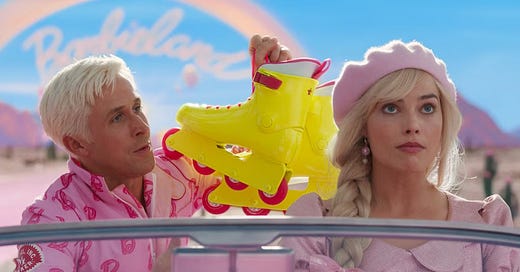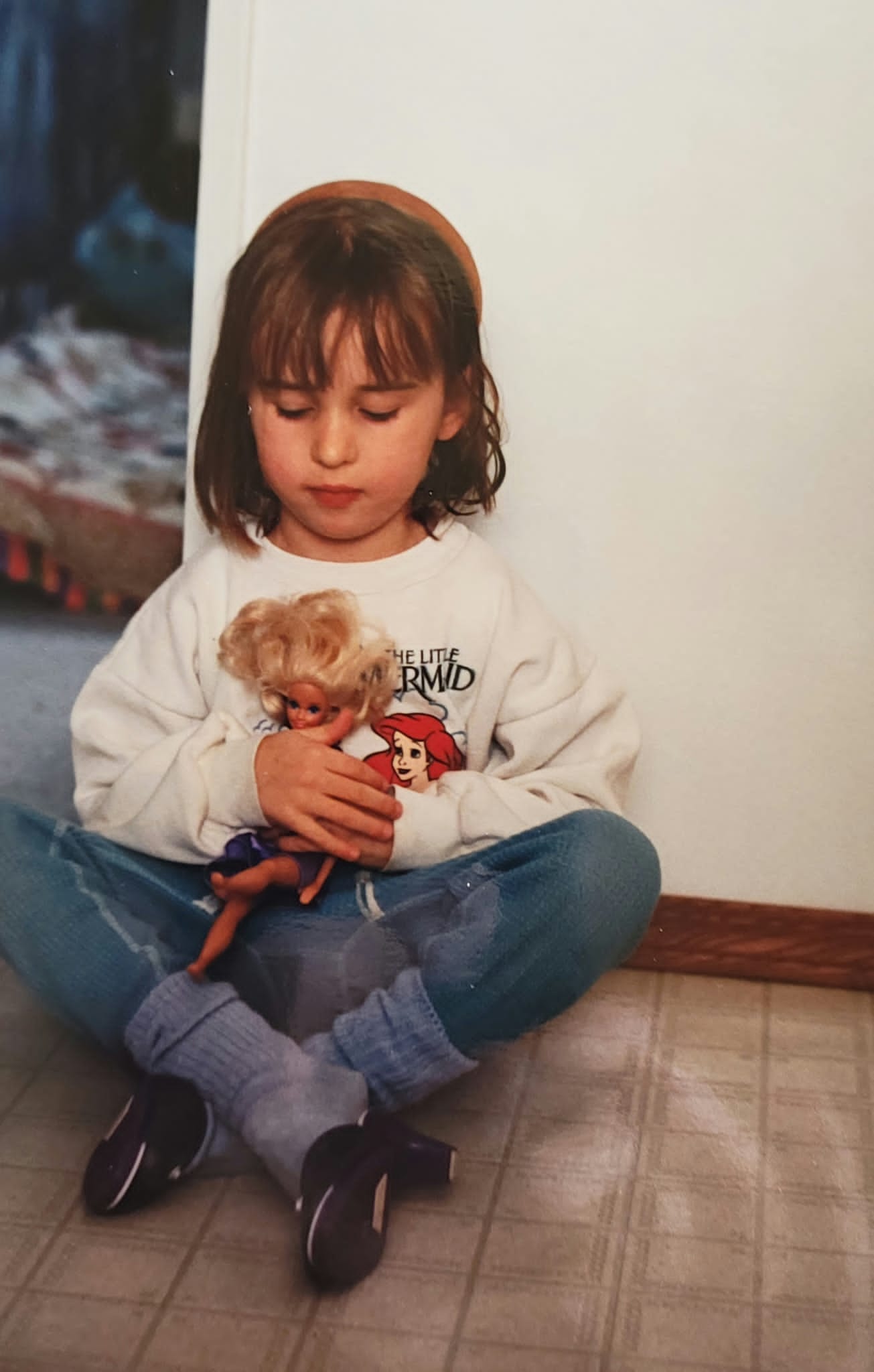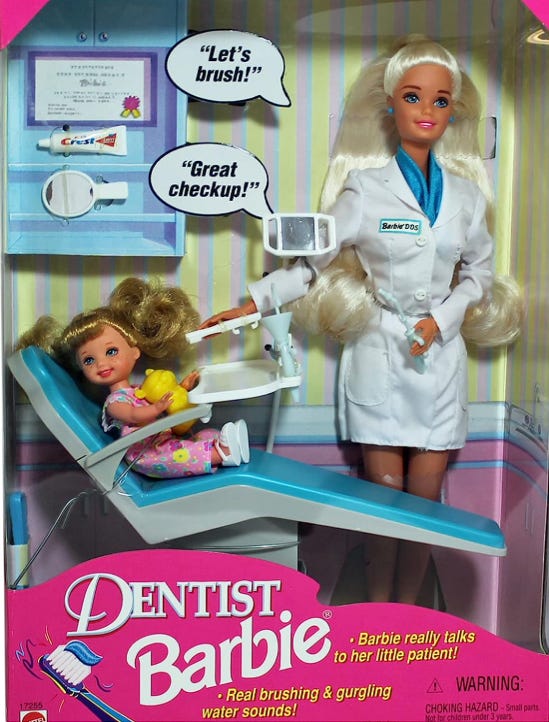Spoilers ahead!
Growing up, I was a Barbie Fanatic. My mom transformed a wheeled bookshelf into an impressive Barbie house, complete with wallpaper, linoleum, and carpet, as well as gorgeous furniture a few sizes too small for Barbies. We selected fabrics for Barbie’s bed, pasted “art” from Sears catalogues on the walls, and borrowed my brother’s mini quad to serve as Barbie’s car. I treated each artifact and Barbie with meticulous care, never losing an itty-bitty fork, and never participating in the common rite of passage of giving Barbie a haircut. I played endlessly with my neighbourhood sister/BFF. Our storylines, both complex and layered, were played until dark and resumed after school the next day.
Confession: I played until I was 13 or 14, BUT I credit Barbies for my fascination with psychology and writing. And I was delighted to see that Greta Gerwig, Barbie movie director, is a kindred spirit: “‘I played with dolls too long,’ says the 39-year-old director. ‘I was still doing it in junior high. Kids were drinking, and I was playing with dolls.’” Same, Greta. Same.
Needless to say, I was ecstatic about the upcoming Barbie movie. I excitedly chatted about it with friends, read Margot Robbie’s cover story in Vogue, listened to The Spill’s podcast episodes, and watched Architectural Digest’s episode on the Barbie Dreamhouse (10/10 recommend watching that episode). And then I bought tickets for the movie itself.
TLDR: I was disappointed! Before diving into my disappointment, I’ll acknowledge the parts I loved:
Details, details, details. The attention to Barbie Land was incredible (shades of pink, the iconic arched foot, the mix of 2D and 3D decor, and Robbie’s doll-like mannerisms). Barbie Land was glorious.
The inclusivity and diversity in Barbie Land!
The acting. Overall, everyone did a great job!
My disappointment is rooted in the plot, which was fuelled by cultural pressures. Based on the trailer and hype, I expected most of the movie to be fun, light, and entertaining — a joyful frolic through Barbie Land! Of course, we knew that Barbie would take a heroine’s journey in the Real World, but I didn’t expect the plot to be so serious from that point forward. The movie quickly turned into Barbie vs. The Patriarchy, and this focus was layered on thick. While I love a feminist take, I didn’t expect the message to be hammered. Relentlessly. Over. And. Over. (I love nuance, and there was no nuance to be had here). Gloria’s lengthy monologue is receiving a lot of praise, and while the words are true and America Ferrera’s delivery was flawless, it didn’t surprise or move me because I’ve been reading and conversing about this material for years. Perhaps this monologue would have been groundbreaking a decade ago, but it wasn’t fresh for 2023.
My central critique is less about the creators, director Greta Gerwig and producer Margot Robbie, and more about our cultural pressure cooker. Today, there’s an expectation for a film — or TV series or book or even a celebrity — to answer for everything and to be for everyone. This sentiment is even captured in the trailer: “If you love Barbie, this movie is for you. If you hate Barbie, this movie is for you.” In an interview with Time magazine, Robbie added: “If you feel indifferent about Barbie or haven’t thought about Barbie in years, this movie is also for you.” In other words, their marketing aligned with our cultural expectation of a single work being for everyone.
The movie was asked to answer for Barbie — to answer for decades of ideas and notions about the doll and to make amends for her complicated legacy. Barbie, after all, is often associated with a number of problematic aspects, such as perpetuating unrealistic body standards, her prototypical whiteness, encouraging consumerism, and backstepping feminism. In my opinion, it’s impossible to provide answers for these aspects. That’s too much pressure on a film. And frankly, that’s too much pressure on a doll. How much is Barbie actually responsible for?
I might be biased due to my historical obsession with Barbie, but I favour her revolutionary toy status over her limitations (My major exception is on the note of inclusivity because I think it’s absolutely critical for kids to see themselves represented).
I think that adults overlay their complicated and jaded perspectives onto Barbies, and these adult perspectives overshadow the perspectives of the children who actually play with the dolls.
Even the correlations between Barbies and negative body image are shaky and sometimes contradictory, with negative body image findings primarily linked to peers, family, and media. While playing as a young girl (and let’s be frank, as a teenager), I wasn’t striving to be Barbie, whom adults see as a sexualized doll with unrealistic body proportions. Instead, I saw Barbie as an extension of me. Through my fictionalized toys, I had wild adventures, navigated relationship dynamics between dolls, fostered real life friendships, and cultivated a rich love for storytelling.
In the movie, the above sentiment was captured in the first thirty minutes of Barbie Land. I loved every magical moment in those scenes and left wanting more. I went to the theatre expecting a fun blockbuster summer movie that offered a vibrant, adventurous escape; essentially, I wanted Barbie Land to infiltrate the real world and not the other way around. Instead, I left the theatre disappointed that the adults in our culture put Barbie between a rock and a hard place, asking her to answer for her limitations and our cultural dysfunction, and asking her to strip away the fun, be serious, and grow up.
If you saw Barbie, I would love to hear your thoughts in the comments!








I also had dentist Barbie!! And I played w Barbies well into junior high too. I remember thinking I would never stop.
I agree w this. It felt behind the times and heavy handed, but based on how many ppl are having revelations at the movie, I fear it’s not behind at all. 🙃😕